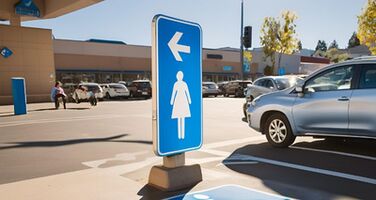
Can I Get a Disabled Parking Permit for Women in Pregnancy?
Introduction
Disabled Parking Permit for Women During Pregnancy - Pregnancy is a life-changing experience, and for many women, it comes with a unique set of physical challenges. As a woman progresses through her pregnancy, the physical toll can become increasingly significant, affecting mobility and daily activities. In some cases, these challenges may warrant the need for a disabled parking permit, which provides closer and more convenient parking access to alleviate some of the physical strain. This article explores whether women in pregnancy can obtain a disabled parking permit, the criteria involved, and how services like HandicapMD.com can assist in the process.
Understanding Disabled Parking tags
A handicap parking tag, also known as a handicap placard or tag, allows individuals with disabilities or mobility impairments to park in designated spots that are closer to building entrances. These tags are intended to make everyday tasks more manageable for those who have difficulty walking or require special accommodations due to medical conditions.
While these tags traditionally associated with permanent disabilities, temporary conditions that severely impair mobility can also qualify an individual for a handicap parking tag. Having babies , particularly when complications arise, can be one such condition.
Pregnant women and Mobility Challenges
Pregnancy is not typically classified as a disability. However, certain conditions and complications related to having babies can significantly impair a woman's ability to walk or move comfortably, potentially qualifying her for a temporary handicap parking permit. Some common mobility challenges during pregnancy that might warrant a handicap parking permit include:
- Severe Back Pain: Many pregnant women experience back pain, especially in the later stages. In some cases, the pain can be debilitating, making it difficult to walk long distances.
- Pelvic Girdle Pain (PGP): PGP is a condition that affects the pelvic joints and can cause severe pain and discomfort, particularly when walking or standing.
- Sciatica: This condition occurs when the sciatic nerve, which runs from the lower back to the legs, becomes compressed. Sciatica can cause sharp pain, tingling, or numbness in the legs, making mobility difficult.
- Severe Swelling (Edema): Swelling in the legs and feet is common, but in some cases, it can become severe and painful, limiting a woman's ability to walk.
- High-Risk: Women with high-risk pregnancies may be advised by their healthcare provider to minimize physical exertion, including walking long distances.
Criteria for Obtaining a Disabled Parking tag During Pregnancy
Each state in the U.S. has its own criteria for issuing handicap parking tags, and the eligibility requirements can vary. However, in most states, the key factor is whether a medical condition significantly impairs mobility. When it comes to having babies, the following considerations may be taken into account:
Medical Certification: The role of your ob-gyn in securing a handicap parking tag plays a crucial role in the application process as a medical certificate is required. This certification should detail the specific condition that impairs mobility and justifies the need for a permit.
Temporary vs. Permanent tags : Most conditions related to having babies are temporary, so a temporary accessible parking tag is usually issued. These tags are typically valid for a few months, depending on the state's regulations and the expected duration of the condition.
Application Process: The application process for an accessible parking tag generally involves submitting a form, along with medical certification, to the local Department of Motor Vehicles (DMV) or relevant authority. Some states may allow applications to be submitted online, while others require in-person submission.
State-Specific Requirements: It's important to note that the criteria and process for obtaining a handicap parking tag can vary by state. Some states may be more lenient in granting tags for related conditions, while others may have stricter guidelines. If your application for a accessible parking tag during pregnancy has been denied, you have the right to appeal the decision.
How HandicapMD.com Can Help
Navigating the process of obtaining a disabled parking tag can be challenging, especially for those dealing with the physical and emotional demands. HandicapMD.com offers a convenient and efficient solution for pregnant women who may qualify for a accessible parking permit.
HandicapMD.com provides telemedicine services, allowing pregnant women to consult with licensed healthcare providers from the comfort of their homes. These providers can assess the individual's condition, determine eligibility for an accessible parking permit, and provide the necessary medical certification. The service is particularly beneficial for women who may have difficulty visiting a healthcare provider in person due to mobility issues.
Conditions Related to Pregnancy That May Qualify for a Disabled Parking tag
Pregnancy can lead to a variety of conditions that may make it difficult for a woman to walk or stand for extended periods. Having a handicap tag during pregnancy offers a range of benefits that go beyond just convenience. From reducing physical strain to providing peace of mind, the advantages of an accessible pass can significantly improve the quality of life for expectant mothers. Below are some specific conditions related to pregnancy that could potentially qualify a woman for a disabled parking tag:
Symphysis Pubis Dysfunction (SPD): SPD is a condition where the pelvic joint becomes unstable, leading to significant pain and difficulty in walking. Women with SPD may find it extremely challenging to walk long distances, making them eligible for an accessible parking tag.
Placenta Previa: This condition occurs when the placenta covers the cervix, leading to potential complications such as bleeding. Women with placenta previa are often advised to limit physical activity, including walking, to reduce the risk of complications.
Preterm Labor: Women who are at risk of preterm labor may be advised to minimize physical exertion, including walking long distances. An accessible parking tag can provide them with closer access to essential services.
Gestational Hypertension or Preeclampsia: High blood pressure during can lead to complications such as preeclampsia, which can cause swelling and pain in the legs. Women with these conditions may be eligible for a accessible parking tag to help manage their symptoms.
Multiple: Carrying twins, triplets, or more can put additional strain on a woman's body, leading to increased discomfort and mobility issues. In some cases, women with multiple pregnancies may qualify for a accessible parking tag.
Gestational Diabetes: Women with gestational diabetes may experience symptoms such as fatigue, weakness, and swelling, which can impair mobility. A disabled parking tag during pregnancy can help them manage these symptoms more effectively.
State-by-State Guidelines for accessible Parking Permits During Pregnancy
The process and criteria for obtaining a disabled parking tag during can vary significantly from state to state. Below is an overview state-specific laws for accessible parking tags in pregnancy:
California: In California, pregnant women who experience severe mobility impairments due to having babies-related conditions may qualify for a temporary accessible parking placard. The application requires medical certification, and the tag is usually valid for up to six months.
New York: New York allows for the issuance of temporary accessible parking tags for related conditions that impair mobility. The state requires a healthcare provider to certify the condition, and the permit's duration is based on the expected recovery period.
Texas: Texas tags the issuance of temporary accessible parking tag for related conditions that significantly impair mobility. The application must include medical certification, and the tag is generally valid for up to six months.
Florida: In Florida, temporary accessible parking tag may be issued for related conditions that impair mobility, provided that a healthcare provider certifies the need. The permit's validity period is typically based on the expected duration of the condition.
Illinois: Illinois allows for temporary accessible parking tags to be issued for related conditions that significantly impact mobility. The application requires a physician's certification, and the tag is valid for a period determined by the physician.
Tips for Applying for a accessible Parking tag During having babies
Applying for a accessible parking tag while pregnant can be a straightforward process if you follow these steps:
Consult HandicapMD: If you need a disabled tag during your related condition qualifies you for a disabled parking permit, consult handicapmd. They can assess your condition and provide the necessary medical certification.
Gather the Required Documentation: Most states require an application form and medical certification to apply for a accessible parking tag. Make sure you have all the necessary documents before submitting your application.
Submit Your Application: Depending on your state, you may be able to submit your application online, by mail, or in person at your local DMV. Be sure to check the specific requirements for your state.
Follow Up: After submitting your application, follow up with the DMV or relevant authority to ensure your application is processed promptly. How long it takes to get a disabled parking tag during pregnancy depends on the DMV office you are applying for as processing times can vary, so it's important to check the status if you don't receive your permit within the expected timeframe.
Understand the Terms of Your tag: If you are granted a disabled parking tag, make sure you understand its terms and conditions, including the expiration date. Temporary tags may need to be renewed if your condition persists beyond the initial validity period.
Legal Considerations and Rights for Pregnant Women
Pregnant women who obtain a disabled parking tag have the same legal rights as any other tag holder. It is important to be aware of your legal rights as a pregnant women to ensure that you are using the tag appropriately and within the bounds of the law:
Usage: A accessible parking tag can only be used when the tag holder is present. If you are driving or being driven to a location, you are entitled to use the designated parking spaces. However, if the tag holder is not present, the tag cannot be used.
Misuse: Misusing a accessible parking tag can result in fines, penalties, and even revocation of the tag. It's important to use the tag only when necessary and in accordance with the law.
Legal Protections: Pregnant women with a disabled parking tag are protected under the Americans with Disabilities Act (ADA). This means that you cannot be discriminated against based on your need for a accessible parking tag, and you have the right to reasonable accommodations.
Renewal and Expiration: If your pregnancy-related condition persists beyond the initial validity period of your permit, you may need to apply for a renewal. The renewal process typically involves obtaining updated medical certification and submitting a new application. It’s important to do this before your permit expires to avoid any gaps in your ability to use disabled parking. In some cases, a renewal or extension of your tag also applies if mobility issues persist postpartum.
FAQs: accessible Parking tags for Pregnant Women
1. Is having babies itself considered a disability for parking tags?
Pregnancy alone is not considered a disability. However, related conditions that impair mobility, such as severe back pain, pelvic girdle pain, or other pregnancy complications that can affect your ability to walk, may qualify a woman for a temporary accessible parking tag.
2. How long is a temporary accessible parking tag valid during having babies ?
The duration of a temporary accessible parking tag typically depends on the specific condition and the state’s regulations. Most tags are valid for a few months, often ranging from three to six months, but this can vary.
3. Can I apply for a accessible parking tag online?
In many states, you can apply for a accessible parking tag online. However, you will still need to submit medical certification, which may need to be signed by a healthcare provider either digitally or physically, depending on the state’s requirements.
4. Do I need to visit a doctor in person to get a accessible parking tag during pregnancy?
Not necessarily. Services like HandicapMD.com offer telemedicine consultations where a licensed healthcare provider can evaluate your condition and provide the necessary certification for a accessible parking tag. This can be especially convenient for pregnant women who may have difficulty traveling.
5. What if my condition improves before my tag expires?
If your condition improves and you no longer need the accessible parking tag, you should stop using it. In some states, you may be required to return the tag to the DMV, while in others, it may simply expire naturally.
6. What happens if my condition persists after my tag expires?
If your related condition persists beyond the expiration of your temporary tag, you can apply for a renewal. You will need to provide updated medical certification to justify the continued need for the tag.
7. Can I use my accessible parking tag in another state?
Yes, accessible parking tags are generally recognized across state lines. However, it’s a good idea to check the specific regulations of the state you’re visiting to ensure compliance with local laws.
8. What are the penalties for misusing a accessible parking tag?
Penalties for misusing a disabled parking permit can include fines, legal penalties, and revocation of the permit. Misuse can involve using the tag when the tag holder is not present or using it beyond its intended purpose.
9. Can I get a accessible parking tag if I’m expecting multiples (twins, triplets, etc.)?
Yes, carrying multiples can increase the physical strain on your body, potentially qualifying you for a temporary disabled parking tag if it significantly impairs your mobility.
10. How can I ensure my application is approved?
To increase the likelihood of your application being approved, make sure to provide thorough and accurate medical documentation that clearly outlines the impact of your elated condition on your mobility. Consulting with a healthcare provider who understands the criteria for disabled parking tags can also be helpful.
The Role of HandicapMD.com in the Application Process
HandicapMD.com simplifies the process of obtaining a accessible parking tag for pregnant women by offering a seamless, online experience. Here’s how HandicapMD.com can assist you:
Telemedicine Consultation: HandicapMD.com offers telemedicine appointments with licensed healthcare providers who specialize in evaluating conditions for accessible parking tags. This means you can get the necessary medical certification without leaving your home.
Medical Certification: After assessing your condition, the healthcare provider can issue the medical certification required for your tag application. This certification is crucial for demonstrating your need for the tag due to related mobility issues.
Streamlined Application Process: HandicapMD.com guides you through the application process, ensuring you have all the necessary documentation and information to submit a complete application. This reduces the risk of delays or rejections.
Support and Resources: In addition to helping with the application process, HandicapMD.com provides resources and support for managing your condition. This can include advice on managing symptoms and tips for staying comfortable and mobile.
Convenient Access: The ability to complete the entire process online means you don’t have to deal with the hassle of visiting a doctor’s office or the DMV in person, making it an ideal solution for pregnant women with mobility issues.
Conclusion
Having babies is a time of significant physical change, and for some women, it can lead to conditions that impair mobility and make daily tasks challenging. While having babies itself is not a disability, certain pregnancy-related conditions may qualify a woman for a temporary accessible parking tag, providing much-needed relief and convenience.
The process of obtaining a accessible parking tag during pregnancy involves medical certification and an application to your state’s DMV or equivalent authority. Services like HandicapMD.com can simplify this process by offering telemedicine consultations, providing the necessary medical certification, and guiding you through the application process.
If you believe you may qualify for a Disabled Parking tag for Women During Pregnancy, don’t hesitate to seek assistance. A accessible parking tag can make a significant difference in your ability to navigate daily life during this important time.
References and Useful Links
- Americans with Disabilities Act (ADA) - ADA.gov
- California DMV - accessible Parking Placards - California DMV
- New York DMV - Temporary Parking tag - New York DMV
- Texas DMV - accessible Parking Placards and Plates - Texas DMV
- Florida Department of Highway Safety and Motor Vehicles - Florida DHSMV
- Illinois Secretary of State - Persons with Disabilities Parking Placard - Illinois Secretary of State
- HandicapMD.com - HandicapMD
- Symphysis Pubis Dysfunction (SPD) in Pregnancy - NHS UK
- Gestational Diabetes - Symptoms and Management - CDC
- High-Risk Pregnancy: Management and Treatment - Mayo Clinic
By taking the time to understand your rights and the process for obtaining a disabled parking permit during pregnancy, you can ensure that you receive the accommodations you need to navigate this special time in your life with greater ease and comfort.
.png)






